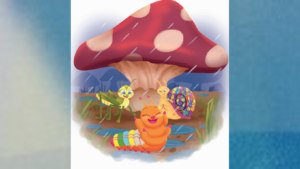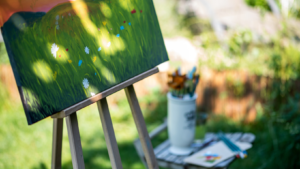A Writer’s Vision
A Writer’s Vision
I watch a robin nestled upon the branch of my backyard tree singing. As it flies away, I feel wonderment. Perhaps the robin is seeking a better view or its next meal. The breeze picks up ever so lightly and I am transported to the wings of a butterfly.
Most would not give a second thought to these events. As a writer, it is these simple, everyday moments that spur my creativity.
There were times in my writing journey when I turned a simple lawn weed into a complete book chapter. Most would view the yellow dandelion as an irritant and nuisance. In contrast, I saw it as something friendly and a great jumping-off point in my story. Many things feed my creativity, especially in nature. However, over the years, I have learned that my imagination goes into overdrive when I add God to the mix.
Every summer for the past four years, I have attended a retreat focused on painting. It is important to note that I have no talent in that realm, yet that particular retreat has been a favorite of mine. I was a bit intimidated, to say the least, when I first attended, but God quickly showed me why He had sent me there.
Something happens in my brain when I focus on things with a crafty nature. I believe God uses this medium to draw things out of me for His greater purpose. Over the years, the masterpieces I have created in this retreat have looked fabulous in my eyes but not so much to anyone else. I see the exhibits through the eyes of the Spirit, who fed me during each brush stroke.
I’ve learned a lot and have had many inspirations through this faith-based activity. Mostly, I have been able to break through barriers that may have kept me from doing something to which God has called me. Using the skills taught during this retreat, I have brought a creative depth to my writing. I drew inspiration from a mushroom while walking the dog that turned into a colorful, giant umbrella for a snail and caterpillar in my book, Bella’s Beautiful Miracle: A Caterpillar’s Journey.

Due to other events this summer, I was forced to miss the art retreat, and I thirsted for a flicker of creativity. This topic arose in a recent conversation, and I quickly realized why I longed for such a spark. As a writer, I see the beauty and majesty in everyday things that most people take for granted. In the hustle and bustle of the summer and planned and unplanned life activities, I had not allowed myself to bathe in God’s beauty in this way.
It is not only the art retreat that fuels creativity. The combination of nature and faith life are significant components. To rejuvenate my creative side, I ventured outside with my laptop and noticed the little robin in minutes. As I looked upon the little bird, all I had to do was place my hands on the keyboard, close my eyes, and allow the Spirit to lead.
By basking in God’s glory of nature, colors, and the physical action of creating, I become fed creatively and spiritually. This summer, I ask you to consider in what ways your spirituality provides your creativity or vice versa. Then, spend time prayerfully considering how God wants you to work that into your lifestyle.
Don’t miss out on your opportunity to shine in ways you may have felt fearful about. I love that I have no talent as a painter, yet I can participate in that action and create something beautiful in another medium. Art, as a spiritual gift or just for fun, is a lovely way to express God’s light and love! Step out of your comfort zone and go for it!

Copyright 2023 Kimberly Novak
Images Copyright Canva


